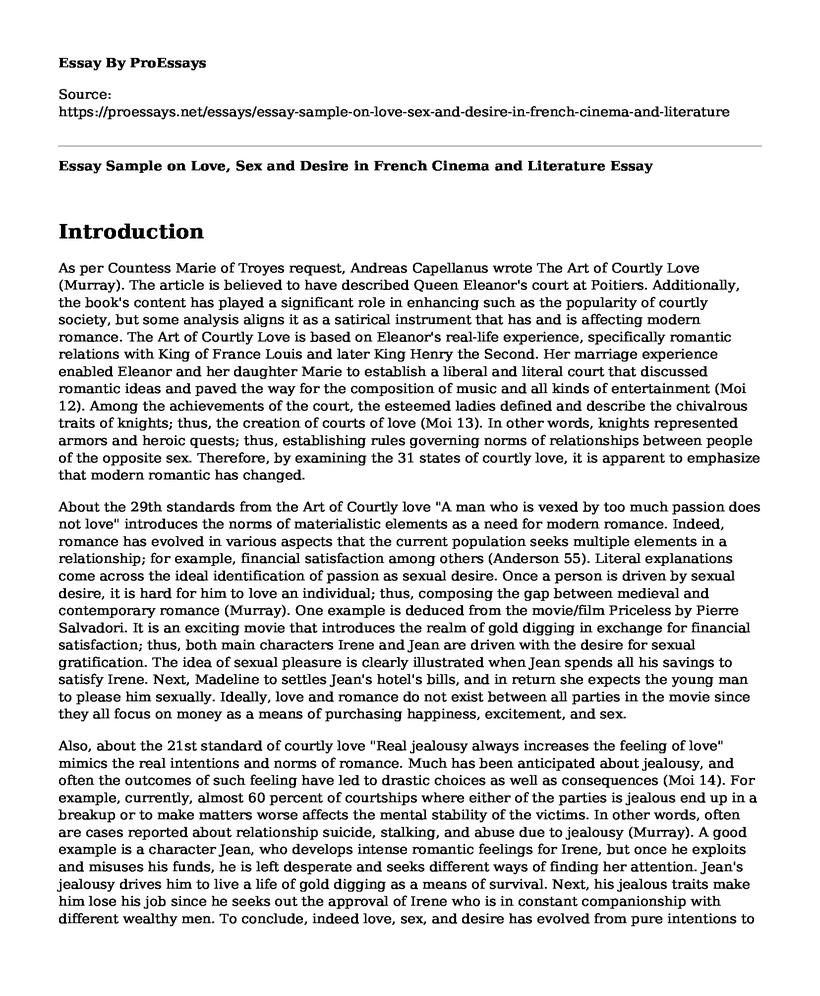Introduction
As per Countess Marie of Troyes request, Andreas Capellanus wrote The Art of Courtly Love (Murray). The article is believed to have described Queen Eleanor's court at Poitiers. Additionally, the book's content has played a significant role in enhancing such as the popularity of courtly society, but some analysis aligns it as a satirical instrument that has and is affecting modern romance. The Art of Courtly Love is based on Eleanor's real-life experience, specifically romantic relations with King of France Louis and later King Henry the Second. Her marriage experience enabled Eleanor and her daughter Marie to establish a liberal and literal court that discussed romantic ideas and paved the way for the composition of music and all kinds of entertainment (Moi 12). Among the achievements of the court, the esteemed ladies defined and describe the chivalrous traits of knights; thus, the creation of courts of love (Moi 13). In other words, knights represented armors and heroic quests; thus, establishing rules governing norms of relationships between people of the opposite sex. Therefore, by examining the 31 states of courtly love, it is apparent to emphasize that modern romantic has changed.
About the 29th standards from the Art of Courtly love "A man who is vexed by too much passion does not love" introduces the norms of materialistic elements as a need for modern romance. Indeed, romance has evolved in various aspects that the current population seeks multiple elements in a relationship; for example, financial satisfaction among others (Anderson 55). Literal explanations come across the ideal identification of passion as sexual desire. Once a person is driven by sexual desire, it is hard for him to love an individual; thus, composing the gap between medieval and contemporary romance (Murray). One example is deduced from the movie/film Priceless by Pierre Salvadori. It is an exciting movie that introduces the realm of gold digging in exchange for financial satisfaction; thus, both main characters Irene and Jean are driven with the desire for sexual gratification. The idea of sexual pleasure is clearly illustrated when Jean spends all his savings to satisfy Irene. Next, Madeline to settles Jean's hotel's bills, and in return she expects the young man to please him sexually. Ideally, love and romance do not exist between all parties in the movie since they all focus on money as a means of purchasing happiness, excitement, and sex.
Also, about the 21st standard of courtly love "Real jealousy always increases the feeling of love" mimics the real intentions and norms of romance. Much has been anticipated about jealousy, and often the outcomes of such feeling have led to drastic choices as well as consequences (Moi 14). For example, currently, almost 60 percent of courtships where either of the parties is jealous end up in a breakup or to make matters worse affects the mental stability of the victims. In other words, often are cases reported about relationship suicide, stalking, and abuse due to jealousy (Murray). A good example is a character Jean, who develops intense romantic feelings for Irene, but once he exploits and misuses his funds, he is left desperate and seeks different ways of finding her attention. Jean's jealousy drives him to live a life of gold digging as a means of survival. Next, his jealous traits make him lose his job since he seeks out the approval of Irene who is in constant companionship with different wealthy men. To conclude, indeed love, sex, and desire has evolved from pure intentions to one that embraces power, wealth, and recognition.
Work Cited
Anderson, Brendan Wyman. "Female agency in the age of Chivalry: Charting a tradition of mutual Chivalry in Chretien de Troyes." Undergraduate Theses. 2015.
Moi, Torii. "Desire in language: Andreas Capellanus and the controversy of courtly love." Harvester Press (n.d): 11-32.
Murray, JJ. Courtly Love's Effect on Modern Romance. 6 July 2016. <https://pairedlife.com/dating/Does-Courtly-Love-Exist-in-Modern-Romance>. Accessed on 8 February 2019
Cite this page
Essay Sample on Love, Sex and Desire in French Cinema and Literature. (2022, Nov 15). Retrieved from https://proessays.net/essays/essay-sample-on-love-sex-and-desire-in-french-cinema-and-literature
If you are the original author of this essay and no longer wish to have it published on the ProEssays website, please click below to request its removal:
- A Response to the City Lights Film
- American Dream and Happiness from the Perspective of Different Characters in Death of a Salesman - Critical Essay
- Compare and Contrast Essay Example: Forms of Slavery Today and in the Movie Slavery by Another Name
- Literary Analysis Essay on The Boys Ambition by Mark Twain
- Essay Example on Patch Adams: Inspiring True Story of Healing With Humor
- Central Park Five: The Story of a Schizophrenic and Divided City - Movie Analysis Essay
- Essay on Aylmer's Obsession: Nathaniel Hawthorne's 'The Birthmark'.







